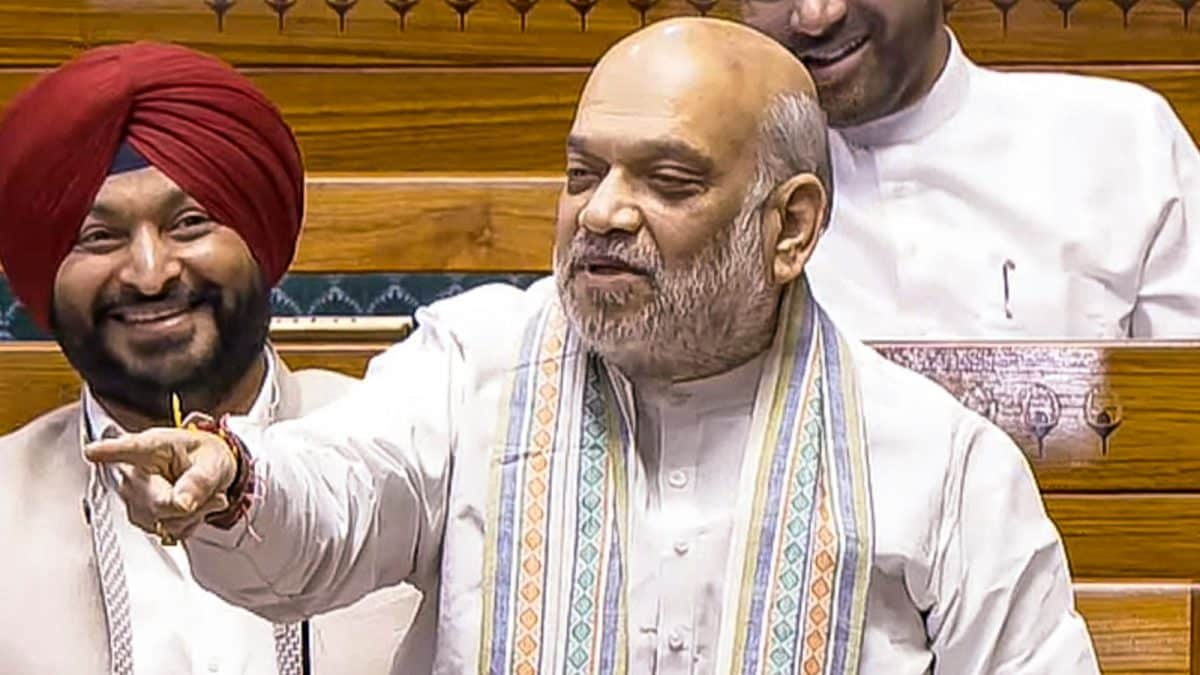Last Updated:
Speaking in favour of the Waqf (Amendment) Bill in the Lok Sabha, Union Home Minister Amit Shah said the Waqf council and board came into existence in 1995, and non-Muslims will have no role in running of religious affairs
Union Home Minister Amit Shah speaks in the Lok Sabha during the budget session of Parliament, in New Delhi on April 2. (Image: Sansad TV/PTI)
Union Home Minister Amit Shah on Tuesday said the Waqf (Amendment) Bill will not interfere with Muslim religious matters and properties donated by them. He said any suggestion otherwise is “fear-mongering for vote bank” and “appeasement politics”.
Speaking in favour of the Bill in the Lok Sabha, after it was tabled in Parliament, Shah said the Waqf council and board came into existence in 1995, and non-Muslims will have no role in running of religious affairs.
“The opposition is trying to spread misconceptions about the Bill. The Waqf bill is not going to interfere with Muslim religious practice…appeasement politics is going on, opposition is doing vote bank politics. You…will break the nation with your myths,” he said, hitting out at the opposition.
Follow Waqf Amendment Bill LIVE Updates Here
He further said there is no provision in the Waqf bill that non-Muslims will be included in the Waqf board. “This Bill is to curb corruption going on in the Waqf board. The Waqf law was made ‘extreme’ in 2013 for appeasement; if it was not done then this bill might not have been needed. The Waqf board is not a religious body but administrative,” he added.
Watch LIVE discussion on the Waqf (Amendment) Bill in the Lok Sabha:
‘GOVERNMENT LAND CANNOT BE WAQF LAND’
Shah alleged that the opposition did not bring in these amendments in 2013, fearing the results of the 2014 Lok Sabha elections. “The Congress denied justice, those who were wronged by the law in 2013. If you would have read clearly, you would have known that this bill is prospective and not retrospective. It is the collector’s responsibility to keep a record of the properties, what is the problem in that? It is the responsibility of the collector to decide whether the land is government land or not. A lot of religious properties have been built, but it cannot be built on government land; isn’t that a requisite?” he asked during the debate.
Clarifying once again that there is no retrospective effect of the law, he questioned why there should be any objection to scrutiny of land. “Government land cannot be Waqf land. It is a stated principle of the Modi government that we will never bring a law for vote bank politics, but will always bring it for the welfare of the people,” he added.
‘NO CITIZEN CAN DARE SAY THEY’LL NOT ACCEPT LAW PASSED BY PARLIAMENT’
Shah further said a joint parliamentary committee (JPC) had been formed that held 38 meetings over the Bill. He said the entire process cannot be dismissed. “…This is not a family-run place, but a place for elected representatives, and nobody is here because of the blessings of some influential people. How can you deny people the right to appeal through a court? You use the public for vote bank, but we will ensure justice for them,” he said, continuing to target the opposition.
Without naming AIMIM chief Asaduddin Owaisi, he said one member of Parliament declared that the minorities will not accept this bill. “What are you trying to say, and why are you saying such a thing? This law, when enforced, will be binding on every citizen. No citizen can dare say they will not accept a law passed by Parliament,” he added.
Earlier, Union Minority Affairs Minister Kiren Rijiju tabled the Waqf (Amendment) Bill, 2025, in the Lok Sabha, which seeks to improve the functioning of Waqf properties, address complexities, ensure transparency and introduce technology-driven management. Tabling the Bill, which was examined and redrafted by a joint parliamentary committee (JPC), he said the legislation has nothing to do with religion, but deals only with properties.

